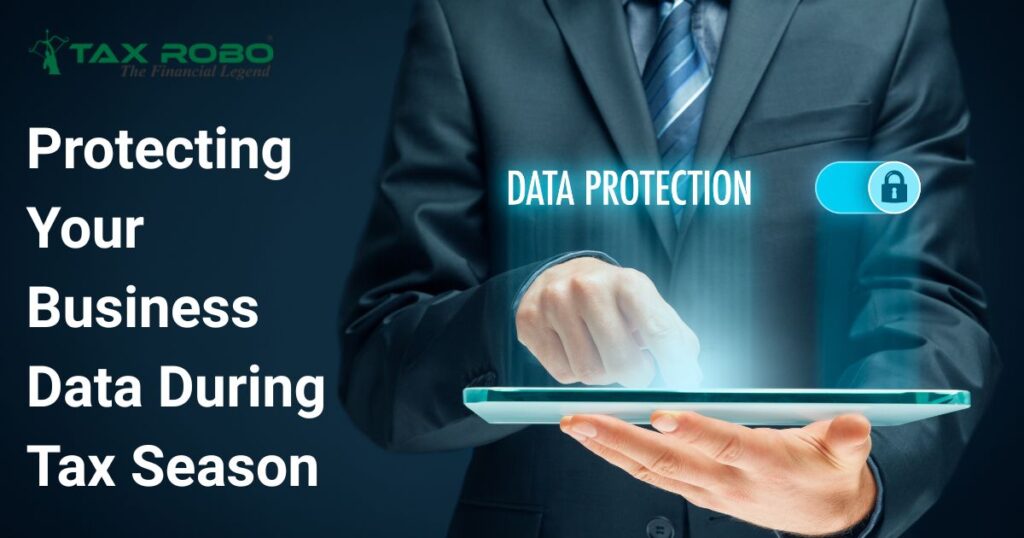Protecting Your Business Data During Tax Season: Essential Tips for Indian Businesses & Individuals
Tax season in India often brings a sense of urgency, a flurry of paperwork, and, unfortunately, increased stress. As small business owners and salaried individuals rush to gather documents, calculate liabilities, and file returns before the deadline, another significant risk looms large: data security. During this busy period, the exchange of sensitive information skyrockets, making it a prime time for cybercriminals and data breaches. Therefore, protecting business data, along with personal financial information, becomes absolutely critical. This post provides actionable tips covering data security during tax season India, specifically tailored for both businesses and individuals, helping you safeguard sensitive details like your PAN, Aadhaar number, bank account information, sales figures, and employee salaries.
Why is Tax Season a High-Risk Period for Data Security?
Tax season inherently creates a perfect storm for data security vulnerabilities. The sheer volume of sensitive financial information being exchanged – both online and offline – increases significantly. We share bank statements, investment proofs, salary details, business revenue figures, and personal identification numbers with accountants, tax portals, and sometimes even through less secure email channels. The pressure of meeting deadlines often leads to carelessness; we might click on a link too quickly, use a weak password for a new portal, or forget to log out of a session on a shared computer.
Cybercriminals actively exploit this environment. Phishing scams become rampant, cleverly disguised as official communications from the Income Tax Department or GST authorities. These fake emails or SMS messages might promise tax refunds, warn of penalties, or request verification of details, aiming to trick you into revealing login credentials or financial information. Fake government portals are also set up to capture sensitive data. Furthermore, involving third parties like accountants or tax preparers, while often necessary, introduces additional touchpoints where your data could potentially be exposed. Even unintentional insider threats, like an employee mishandling data due to the rush, pose a risk. Understanding these heightened risks underscores the importance of safeguarding business information during taxes.
Essential Digital Security Measures for Protecting Business Data
In today’s digital age, most tax-related activities involve computers, the internet, and software. Therefore, implementing robust digital security measures is the first line of defence in protecting business data and personal financial information during tax season. This involves securing your devices, staying alert to online threats, and ensuring data is handled securely during transmission and storage. These business data protection tips India focus on practical steps you can take right now.
Secure Your Devices and Network
Your computers, smartphones, and the network connecting them are gateways to your sensitive data. Securing them is non-negotiable.
Actionable Tips:
- Use Strong Credentials: Employ strong, unique passwords for every financial account, tax filing portal (like the Income Tax portal), email account, and device login. Avoid easily guessable passwords like “password123” or your birthdate. Consider using a password manager. Crucially, enable Multi-Factor Authentication (MFA) wherever available, especially for email, banking portals, and the official tax websites. MFA adds an extra layer of security beyond just a password.
- Keep Software Updated: Regularly update your computer’s operating system (Windows, macOS), your web browser (Chrome, Firefox, Edge), and your antivirus/anti-malware software. Updates often contain critical security patches that fix vulnerabilities exploited by cybercriminals. Set software to update automatically if possible.
- Secure Your Wi-Fi: Ensure your home or office Wi-Fi network is protected with a strong password using WPA2 or WPA3 encryption. Change the default router password as well. Avoid using public Wi-Fi networks (like those in cafes, airports, or hotels) for accessing bank accounts, filing taxes, or transmitting any sensitive financial data. If you must use public Wi-Fi, use a reputable Virtual Private Network (VPN) service, which encrypts your internet traffic, making it much harder for others on the network to intercept your data. These practices are fundamental for protecting business data in India from unauthorized network access.
Be Vigilant Against Phishing and Malware
Phishing attacks and malware infections are major threats, especially during tax season when cybercriminals leverage tax-related themes.
Actionable Tips:
- Identify Phishing Attempts: Learn to spot suspicious emails or SMS messages. Look for red flags like:
- Generic greetings (e.g., “Dear Taxpayer”) instead of your name.
- Sender email addresses that look unofficial or are slightly misspelled versions of legitimate ones.
- Urgent calls to action demanding immediate payment or threatening penalties.
- Requests for sensitive personal information (PAN, Aadhaar, bank details, passwords) – legitimate organizations rarely ask for these via email/SMS.
- Poor grammar, spelling mistakes, or awkward phrasing.
- Links that, when hovered over, show a different web address than expected.
- Don’t Click Blindly: Never click on links or download attachments in unsolicited emails or messages related to tax refunds, notices, or filing updates, even if they appear to be from the government or your bank.
- Verify Directly: If you receive a suspicious communication, independently verify it. Go directly to the official government portals by typing the address in your browser or using saved bookmarks. Do not use links from the suspicious email.
- Official Income Tax Department Portal: https://www.incometax.gov.in/
- Official GST Portal: https://www.gst.gov.in/
- Install Security Software: Use reputable antivirus and anti-malware software on all your devices and keep it updated. Run regular scans.
Secure Data Transmission and Storage
How you send and store your financial documents is just as important as securing your devices.
Actionable Tips:
- Secure Sharing: When you need to share tax documents (like Form 16, bank statements, invoices) electronically with your accountant or tax preparer, avoid using unsecured methods like standard email attachments or consumer messaging apps (like WhatsApp). Instead, use:
- Encrypted Email: Services that offer end-to-end encryption.
- Secure File-Sharing Portals: Reputable cloud storage services often have secure sharing options with password protection and expiry dates. Many accounting professionals use dedicated client portals for this purpose.
- Encrypt Stored Data: Protect sensitive files stored on your computer’s hard drive or in cloud storage. You can:
- Password-protect individual files (like PDFs or ZIP archives containing multiple documents).
- Use built-in encryption tools like BitLocker (Windows) or FileVault (macOS) to encrypt your entire hard drive.
- Ensure your cloud storage provider offers encryption at rest (data encrypted while stored on their servers).
- Backup Regularly: Perform regular backups of all your important financial and tax data. Store backups securely, ideally using a combination of an external hard drive (kept disconnected when not in use) and a secure, encrypted cloud backup service. Test your backups occasionally to ensure you can restore data if needed. Implementing these measures represents core business data protection tips India.
Physical Security and Document Handling
While digital threats are prominent, don’t overlook the importance of physical security for documents and devices, especially when safeguarding business information during taxes.
Safeguarding Physical Documents
A surprising amount of sensitive data still exists in paper form.
Actionable Tips:
- Secure Storage: Keep physical copies of tax returns, financial statements, investment proofs, invoices, PAN card copies, Aadhaar card copies, bank statements, and salary slips in a locked filing cabinet, drawer, or safe. Limit access to these storage locations.
- Mindful Printing: Be conscious when printing sensitive documents. Don’t leave them unattended on the printer tray in shared office spaces. Collect printouts immediately.
- Proper Disposal: Shred any documents containing sensitive financial or personal information before discarding them. This includes old tax returns (beyond the retention period), bank statements, expired cards, pre-approved credit offers, and anything with your PAN, Aadhaar, or bank details. Simply tearing them up or throwing them in the regular bin is not secure.
Securing Physical Devices
The devices holding your digital data also need physical protection.
Actionable Tips:
- Lock Screens: Always lock your computer screen (using Ctrl+Alt+Del on Windows or the lock screen shortcut on macOS) when you step away from your desk, even for a few minutes. Set your devices to automatically lock after a short period of inactivity.
- Physical Security: Keep laptops, tablets, and smartphones physically secure, especially when working remotely, traveling, or in shared office environments. Don’t leave them unattended in public places or visible in parked cars.
- Prevent Shoulder Surfing: Be aware of your surroundings when accessing sensitive financial data or entering passwords on your devices in public spaces (like cafes, trains, or airports). Position your screen away from prying eyes.
Working Securely with Third Parties (Accountants/Tax Professionals)
Most businesses and many individuals rely on accountants or tax professionals (like Chartered Accountants – CAs) for tax preparation and filing. While they provide valuable expertise, sharing your data with them requires careful consideration for security. This is a vital part of safeguarding business information during taxes when outsourcing.
- Verify Credentials: Choose a reputable and trustworthy tax professional or firm. Ask about their experience, qualifications, and specifically, their data security and privacy policies. Understand how they protect client data. Look for professionals who are transparent about their security practices.
- Secure Data Sharing: Insist on using secure methods for sharing your documents (as discussed in Section 2.3). If your CA suggests emailing sensitive documents without encryption, push back and ask for a more secure alternative like a dedicated client portal or encrypted file transfer. Clearly communicate your expectation for secure data handling.
- Limit Access: Provide only the information and documents absolutely necessary for the specific tax task. Ask who within their firm will have access to your data and how that access is controlled and logged.
- Non-Disclosure Agreements (NDAs): For businesses sharing significant amounts of confidential financial or operational data, consider asking the accounting firm or CA to sign a Non-Disclosure Agreement (NDA). This provides legal recourse if your data is mishandled or disclosed improperly.
- Retrieve/Destroy Data: Once the engagement is complete, understand their policy for data retention. If possible, request that they securely destroy or return your sensitive documents after the legally required retention period.
Specific Considerations for Small Businesses vs. Salaried Individuals
While many security principles apply universally, there are some specific points of focus depending on whether you’re a business owner or a salaried employee. Understanding how to protect business data tax time requires acknowledging these nuances.
For Small Business Owners
Business owners handle not only their own financial data but also potentially sensitive information related to customers, employees, and suppliers.
Focus Areas: Protecting customer payment details, employee payroll records (salaries, PANs, bank accounts), Goods and Services Tax (GST) data, detailed sales and purchase ledgers, and proprietary financial information.
Actionable Tips:
- Implement Access Controls: Ensure that only authorized personnel have access to sensitive financial data and accounting systems. Use role-based access controls within your accounting software. Regularly review who has access to what.
- Employee Training: Conduct regular security awareness training for employees, especially those handling financial data, payroll, or customer information. Train them on identifying phishing scams, using strong passwords, and handling data securely.
- Secure Accounting Software: Use reputable accounting software and ensure it’s always updated to the latest version. Secure login credentials for the software diligently. Choose software known for strong security features.
- Data Privacy Compliance: Be aware of your obligations under Indian law, particularly the Digital Personal Data Protection Act, 2023 (DPDP Act), regarding the collection, processing, and protection of personal data (including employee and customer data). Ensure your data handling practices comply with legal requirements.
For Salaried Individuals
Salaried individuals primarily need to protect their personal financial and identification documents during the tax filing process.
Focus Areas: Protecting Form 16/16A, salary slips, bank account statements, investment proofs (like ELSS statements, housing loan certificates, insurance premium receipts), PAN card details, and Aadhaar card details.
Actionable Tips:
- Careful Document Submission: Be cautious when submitting investment proofs or other documents to your employer for tax deduction purposes or to your tax consultant. Use secure methods and confirm receipt.
- Secure Storage: Securely store both digital (password-protected files, encrypted folders) and physical copies (locked cabinet) of your tax-related documents. Remember the retention periods (see FAQs).
- Monitor Finances: After tax season, keep a close eye on your bank accounts, credit card statements, and credit reports for any unauthorized transactions or suspicious activity. Report discrepancies immediately.
- Use Official Portals: Always use the official Income Tax Department portal (https://www.incometax.gov.in/) for filing returns, checking refunds, or responding to notices. Bookmark the correct URL and avoid clicking links from emails or search engine results that might lead to fake sites.
Conclusion
Tax season undeniably amplifies the risks associated with handling sensitive financial information. For both businesses and individuals in India, being proactive about protecting business data and personal details is not just good practice – it’s essential for financial security and peace of mind. By implementing robust digital security measures like using strong passwords and MFA, staying vigilant against phishing, updating software, ensuring physical document security, and collaborating securely with third parties, you can significantly reduce your vulnerability to data breaches and cyber fraud.
Remember, data security isn’t just a tax season concern; it requires consistent vigilance throughout the year. Make these practices a regular part of your routine. By taking these steps, you are actively protecting business data and personal information, safeguarding your financial health, and ensuring compliance in today’s increasingly digital world.
Need assistance with secure tax filing, robust accounting practices, or expert advice on data protection? Contact TaxRobo today for professional support tailored to your needs. Visit our TaxRobo Online CA Consultation Service page to learn more.
Frequently Asked Questions (FAQs)
Q1: Is it safe to file my taxes online in India?
Answer: Yes, filing taxes online through the official Government of India Income Tax portal is generally safe, provided you follow secure practices. Always ensure you are on the correct website: https://www.incometax.gov.in/. Use a strong, unique password and enable MFA if available. File using a secure, private Wi-Fi network (not public Wi-Fi) and ensure your computer has updated antivirus software and operating system.
Q2: What should I do if I suspect my financial data has been compromised during tax season?
Answer: Act immediately. Change the passwords for all potentially affected accounts (email, banking, tax portal). Notify your bank and credit card companies about potential fraud. Monitor your financial statements and credit reports very closely for any unauthorized activity. Consider reporting the incident to the National Cyber Crime Reporting Portal: https://cybercrime.gov.in/.
Q3: How long should I keep my tax documents secure in India?
Answer: According to the Income Tax Act, 1961, you should generally maintain books of accounts and other relevant documents for a period of six years from the end of the relevant assessment year. For certain cases involving transfer pricing or specific legal proceedings, the duration might be longer (often cited as up to 8 years for practical safety). It is crucial to store these documents, whether physical or digital, securely throughout this retention period.
Q4: Can using accounting software help in protecting business data?
Answer: Yes, reputable accounting software can significantly enhance data security. Features often include data encryption (both in transit and at rest), user access controls (limiting who can see or modify data), audit trails (logging user activity), and automated backup options. However, the software’s security is only effective if you use strong, unique login credentials, keep the software updated, and follow secure practices yourself.
Q5: What are the biggest data security mistakes people make during tax season in India?
Answer: Some common and dangerous mistakes include:
- Using weak or reused passwords for tax portals and financial accounts.
- Clicking on phishing links or downloading attachments in fake tax-related emails/SMS.
- Sharing sensitive documents like PAN, Aadhaar, and bank statements insecurely via unencrypted email or messaging apps like WhatsApp.
- Using unsecured public Wi-Fi for tax filing or accessing financial information.
- Improperly disposing of physical documents (not shredding them).
- Not enabling Multi-Factor Authentication (MFA) where available.



